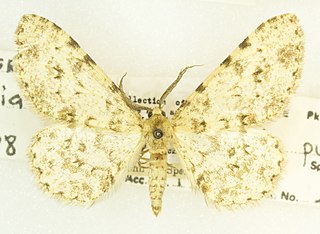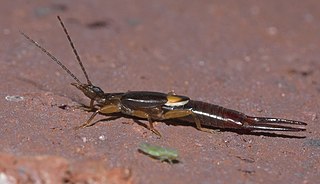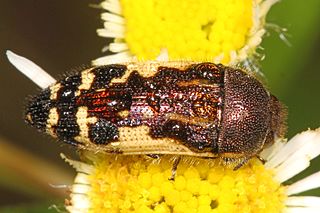
Earwigs make up the insect order Dermaptera. With about 2,000 species in 12 families, they are one of the smaller insect orders. Earwigs have characteristic cerci, a pair of forcep-like pincers on their abdomen, and membranous wings folded underneath short, rarely used forewings, hence the scientific order name, "skin wings". Some groups are tiny parasites on mammals and lack the typical pincers. Earwigs are found on all continents except Antarctica.

Gaillardia pulchella is a North American species of short-lived perennial or annual flowering plants in the sunflower family.

Forficulidae is a family of earwigs in the order Dermaptera. There are more than 70 genera and 490 described species in Forficulidae.

Spongiphoridae is a family of earwigs in the suborder Neodermaptera. There are more than 40 genera and 510 described species in Spongiphoridae.

Stenoporpia pulchella is a species of geometrid moth in the family Geometridae. It is found in North America.

Doru taeniatum, the lined earwig, is a species of earwig in the family Forficulidae. It is found in Central America, North America, and South America.

Vostox brunneipennis is a species of earwig in the family Spongiphoridae. It is found throughout the Americas.

Vostox is a genus of earwigs in the family Spongiphoridae, found in the Americas. There are more than 20 described species in Vostox.

Marava arachidis is a species of earwig in the family Spongiphoridae. It is found in Africa, Australia, the Caribbean, Europe, Northern Asia, North America, South America, and Southern Asia. It inhabits the stems of fennel and females will lay eggs on fennel leaves.

Marava is a genus of earwigs in the family Spongiphoridae; most records are from the Americas, but M. arachidis is cosmopolitan. There are more than 50 described species in Marava.

Sacodes pulchella, the beautiful marsh beetle, is a species of marsh beetle in the family Scirtidae. It is found in North America.
Vostox apicedentatus, the toothed earwig, is a species of earwig in the family Spongiphoridae. It is found in Central America and North America.
Orthosia pulchella is a species of cutworm or dart moth in the family Noctuidae. It is found in North America.

Acmaeodera pulchella, the flat-headed bald cypress sapwood borer, is a species of metallic wood-boring beetle in the family Buprestidae. It is found in North America.

Orthonevra pulchella (Williston 1887) the Dusky Mucksucker is a fairly common species of syrphid fly. It has been observed from across northern North America. Hoverflies get their names from the ability to remain nearly motionless while in flight. The adults are also known as flower flies for they are commonly found around and on flowers, from which they get both energy-giving nectar and protein-rich pollen. Larvae for this genus are of the rat-tailed type. O. pulchella larvae have not been described.
Heteropeza is a genus of gall midges and wood midges in the family Cecidomyiidae. There are about six described species in Heteropeza.

Neodermaptera, sometimes called Catadermaptera, is a suborder of earwigs in the order Dermaptera. There are more than 2,000 described species in Neodermaptera.
Neolobophorinae is a subfamily of earwigs in the family Forficulidae. There are about 5 genera and 19 described species in Neolobophorinae.

The Spongiphorinae are a medium-sized subfamily of earwigs in the superfamily Forficuloidea, sometimes called "little earwigs", erected by Karl Wilhelm Verhoeff in 1902. Distribution records appear to be incomplete, but genera such as Spongiphora originate from the Americas including the Caribbean; certain species such as Marava arachidis, have a cosmopolitan distribution.













